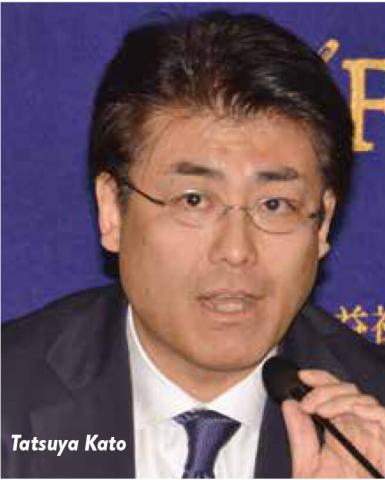Issue:
A former Seoul bureau chief who was on the sharp end of South Korea’s defamation laws may have touched upon the president’s biggest taboo.
No sympathy for Park’s pickle
by JULIAN RYALL

“My suspicion was that she was just making statements according to whatever her close and powerful advisor was instructing her to say”
BY THE TIME THE printed edition of this magazine reaches its readers, South Korean President Park Geun-hye may very well have been impeached, forced to step down and be facing criminal charges for a snowballing corruption scandal. But Tatsuya Kato, the former Seoul bureau chief for the Sankei Shimbun, has little sympathy for Park’s plight.
Kato was targeted by the Park administration after writing a story that repeated local media reports about the president’s whereabouts on the day of the sinking of the Sewol ferry in April 2014 a tragedy that claimed the lives of 304 people, the majority of whom were high school students. As well as quoting from South Korean media, Kato’s sources also claimed that Park was with a man on the day of the disaster and only reappeared to take charge of the situation seven hours later.
Kato was charged with defaming the president. Although he faced an 18 month prison term if found guilty, he opted to fight the case rather than publish a retraction and an apology.
And as he continued his examination of goings on in the Blue House, Kato told a press conference at the FCCJ on Nov. 16, his reservations about the people exerting pressure on Park’s administration quickly grew. “My suspicion was that she was just making statements and comments according to whatever her close and powerful advisor was instructing her to say,” Kato said.
“Today, the Park administration and her close friends and family members are under investigation for having access to state secrets,” he continued. “My personal impression is that their influence has been the cause of the president’s unique world view.” A name that has dominated South Korean headlines for the last month is that of Choi Soon-sil, who is being questioned by authorities over her alleged access to secret state documents and of using her close friendship with the president to convince many of the nation’s biggest companies to pay vast sums of money to foundations set up in her name.
Kato said he first came across Choi’s name in the summer of 2014, coinciding with the start of the “500 days in which I was in a battle with the Park administration.” Initially, senior Blue House staffers took exception to Kato’s reporting, but he claims the Park administration later commissioned a citizens’ group to carry out various kinds of harassment before he was formally charged with defaming the president.
AFTER KATO REFUSED TO retract the article and issue an apology, he was indicted by local prosecutors. “For those of us familiar with Japanese democracy, a court is usually seen as a place to objectively make judgments based on law and evidence, a place for finding out the truth and delivering justice,” he said. “However, in my opinion, the Seoul central district prosecutors’ office seemed to see court as a place to punish and condemn this unfavorable Japanese journalist rather than to serve as a place of judgment and fairness.
“For me, the thought that a nation state could see an article in a foreign language and for a foreign audience as a threat and to use that as justification to prosecute a single journalist seemed fundamentally removed from modern values.”
Addressed as “suspect Kato” throughout the investigation and court proceedings, Kato was asked why he had written about the president and her close friends, who his sources were and whether he had “conspired” with left wing media in Korea “to draw out the president’s personal relationships with ill intent. “These questions were asked so many times, I gradually realized that I must have hit upon President Park’s biggest taboo, which had previously been a secret.”
That taboo was her lack of a grasp on important events going on around her government and her inability to formulate or carry out policies. One example of President Park’s inability to make a decision for herself and her reliance on Choi Soon-sil, Kato suggests, is on the question of free speech. Questioned repeatedly on her position on the matter, “she never once made her own statement on the issue,” Kato said.
He added that more than one source has confirmed that Park was also taken aback when she was informed that Kato was still in South Korea. “The fact that the president of Korea was not aware of the details of the case, a case that much of the world was focusing on with criticism and concern, was very troubling and shocking to me,” Kato said. “And this is what led me to my conclusion that the president was not receiving accurate information regarding political issues. She was disconnected. I concluded that she has no initiative when she makes statements but is merely following a scenario written by other advisors or puppet masters.”
The judge hearing the case eventually acquitted Kato, saying that his coverage had been “inappropriate” but insisted there was a need to protect freedom of speech.
Given his passport back, Kato returned to Japan in April and is now senior writer on social issues for the Sankei Shimbun.
Julian Ryall is Japan correspondent for the Daily Telegraph.

